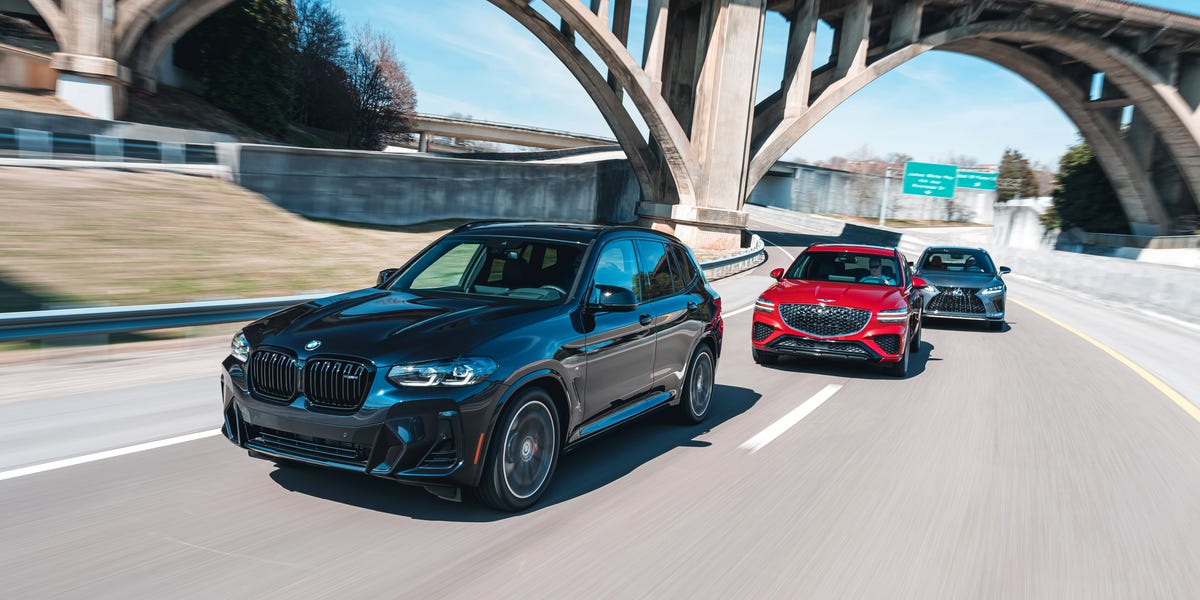Tested: 2022 BMW X3 M40i vs. Genesis GV70 3.5T Sport vs. Lexus RX350 F Sport

From the May 2022 issue of Car and Driver.
Buyers can’t get enough of leather-lined compact SUVs with status badges, which are now the core of the premium-car market. While consumers are giving up some of the performance and handling of sedans, the demand for wagon-like versatility and an above-the-cars seating position has propelled these SUVs to prominence. Into this white-hot arena Genesis throws its new GV70 crossover, arguably the most important product yet from Hyundai’s nascent luxury brand.
Unfortunately, the vast number of vehicles in this segment is matched by the vast scope of the auto industry’s supply disruptions. Vehicle shortages made a giant comparison test impossible. Instead, we opted to take the GV70’s measure against two SUVs that have long stood as templates for the segment: the BMW X3 and the Lexus RX.
Marc UrbanoCar and Driver
Most entries in this segment kick off just north of $40K. But all-wheel drive, six-cylinder power, and a long list of extras pushed our average as-tested price to $64,243, with our three competitors separated by a slim $1930. The price point works in the GV70’s favor, as that money will buy the top Sport Prestige model fitted with the optional 375-hp twin-turbo 3.5-liter V-6 and nearly every imaginable feature, from leather-and-suede seats to a head-up display.
Lexus started this automotive genus when it launched the RX300 for 1998. Easygoing refinement and proven reliability—plus annual sales that regularly top 100,000—have been the RX’s hallmarks ever since. Its current fourth generation also pushes the boundaries of tasteful SUV exterior design and offers both conventional and hybrid powertrains. We settled on the RX350, powered by a standard 295-hp 3.5-liter V-6 and dressed in optional F Sport regalia.
Marc UrbanoCar and Driver
The BMW X3 M40i serves as the other bookend. Decidedly more performance oriented than the Lexus, the Bimmer features a 382-hp sweetheart of a turbocharged 3.0-liter inline-six and convincingly upholds the notion that this is a 3-series wagon writ taller.
Our trio assembled, we bolstered our usual back-road shakedowns with the highway runs and urban crawls that are the real life of SUVs. With test results and interior measurements in hand, the GV70’s place on the spectrum came into focus.
3rd Place:
2022 Lexus RX350 F Sport AWD
Michael SimariCar and Driver
Highs: Quiet, fuel efficient, pleasant ride quality.
Lows: Not interested in being fun to drive, aging interior, annoying touchpad interface.
Verdict: A popular luxury appliance that’s due for an update.
With the RX350 well down on horsepower and carrying the most mass, we were hardly surprised that the others left it in the dust when the accelerator hit the cut-pile carpet. At 6.7 seconds to 60 mph, it trailed both the GV70 and the X3 by more than two seconds. While we welcomed the linear power delivery and lovely induction honk of Lexus’s naturally aspirated 3.5-liter V-6, its relatively high 4700-rpm torque peak and relatively low 267 pound-feet of torque mean it lacks the effortless low-end surge of modern turbocharged engines. An eight-speed automatic transmission tuned to race for top gear also kept any semblance of sportiness at bay. “There’s no sense of urgency to any aspect of this thing,” observed technical editor David Beard.
Michael SimariCar and Driver
The RX350’s F Sport package dresses up the interior in what looks like sassy red cowhide but is actually a still-sassy synthetic material.
Indeed, with the smallest brakes and narrowest tires, the Lexus also lagged behind the others in stopping distances and cornering grip. Its mushy brake pedal, slow steering, and body roll in corners kept back-road speeds in check. Switching to the more aggressive Sport and Sport+ modes did little to pull the RX out of its slumber. Dropping $1050 on the Handling package, which brings adaptive dampers to the largely ornamental F Sport trim, also failed to add significant sportiness.
Those dampers were likely tuned to provide cushiness, and we judged the RX to have the plushest ride quality of the bunch. The transmission’s affinity for top gear helped the RX350 tie the X3’s 20 mpg for best observed fuel economy, and the quiet cabin matched the GV70’s hushed sound readings at both full throttle and 70 mph. Outward visibility was deemed good, if not as expansive as in the thin-pillared Genesis, and all drivers found easy comfort in the F Sport’s supportive front seats. The Lexus’s largest-on-paper back seat, however, was the least comfortable, especially with three adults stuffed back there.
Michael SimariCar and Driver
Despite our example’s natty red seats and decent roster of tech and convenience features, the RX’s biggest turnoffs are its aging interior and its infotainment system’s unintuitive touchpad controller. Lexus is finally addressing this ergonomic misstep in newer models and has added touchscreen functionality to the RX. But there are still signs of antiquity, from the CD player in the dash to the cruise-control stalk lifted from the 2007 Toyota 4Runner. Though undeniably appealing to the masses, the RX350 is clearly ready for a redesign.
2nd Place:
2022 BMW X3 M40i
Marc UrbanoCar and Driver
Highs: Inline-six of the gods, convincingly sporty, surprisingly efficient.
Lows: Unyielding suspension, lacking in luxuries, the priciest here.
Equals: An awesome horse leading a stiff carriage.
Exercising the X3 M40i engenders deep fondness for the strength and turbine-like smoothness of its B58 turbocharged inline-six, which has a transformative effect on this unassuming crossover. Aided by a borderline-clairvoyant ZF eight-speed automatic, it blasted our test car to 60 mph in 4.1 seconds, gapping the GV70 by a half-second. Lag from the turbo is essentially nil, and a newly added 48-volt hybrid system recoups energy to help run the accessories and fill in what dips might exist in the engine’s powerband. The M40i weighs a relatively svelte 4378 pounds—the lightest here by 205 pounds—and its as-tested fuel economy tied the far-less powerful RX350’s.
Marc UrbanoCar and Driver
The X3’s hard-to-read digital gauges are an affront to old BMWs. Mocha Vernasca leather costs $1450 and answers the question: What can brown do for you?
The M40i’s best-in-test results extend to its 158-foot stop from 70 mph and 0.88 g of skidpad grip, thanks to upgraded brakes, the optional electronically controlled limited-slip rear diff, and summer tires (the only vehicle here so equipped). Though the Bimmer was the clear winner at the test track, its on-road demeanor left us wishing for better steering and more suspension compliance. The X3 responds eagerly to inputs from the thick steering wheel, but it proved too lifeless and quick off-center for some. As in the GV70, there are numerous settings to adjust its over-the-road character, but the M40i’s Adaptive M suspension starts stiff and only gets stiffer as you cycle through the sportier settings that “may as well be labeled Viagra and Cialis,” Beard quipped.
Marc UrbanoCar and Driver
A refresh for ’22 brings the BMW an even larger kidney grille and new headlights, taillights, and bumpers. Despite having the highest base and as-tested prices, our lightly optioned test car was the least inviting of the group, lacking available extras such as adaptive cruise control, wireless device charging, and a surround-view camera system. As in many current BMWs, the steering column does not tilt down far enough for some drivers, and the X3’s front seats were chided for being hard, flat, and short on comfort. BMW’s iDrive infotainment setup, which continues to improve with each iteration, is augmented by touch and gesture controls for the M40i’s 12.3-inch center display, though its complex menu structure still has some of us gnashing our teeth.
While the strength of the M40i’s powertrain put the X3 atop the fun-to-drive category, its performance bent exemplifies the inherent drawbacks and trouble with trying to get a tall and heavy SUV to dance like a sports sedan. The performance never quite measures up, and the day-to-day driving experience suffers.
1st Place:
2022 Genesis GV70 3.5T Sport AWD
Marc UrbanoCar and Driver
Highs: Beautiful design throughout, solid performance, punches above its class.
Lows: Disappointing gas mileage, some ergonomic foibles, explaining Genesis to everyone.
Verdict: Genesis did its homework and turned in a winner.
With the GV70, Genesis essentially marries the poshness and clean design of the larger GV80 SUV with the behind-the-wheel verve of its smaller G70 sports sedan—both of which have been 10Best winners. The result is a compact SUV that blends style, comfort, and driving excitement. “Just an overall enjoyable and cohesive experience,” read one logbook comment.
Marc UrbanoCar and Driver
The GV70’s Sport Prestige package adds leather with grippy suede inserts that, along with those sassy red seatbelts, help hold you in place.
Despite its all-season rubber, the sportiest GV70 is no slouch when asked to hustle. Our test car dashed to 60 mph in 4.6 seconds and gave up less than we expected to the summer-tire-wearing BMW on the skidpad and in our 70-to-zero braking test. The GV70’s twin-turbo V-6 is down seven horses to BMW’s inline-six and emits a more gravelly tone from its bazooka tailpipes. But an eight-speed automatic smoothly harnesses the engine’s 391 pound-feet of torque—the most in this test—and the GV70’s drive modes can effectively alter its temperament from RX350 calm to M40i edgy.
Its steering is precise without feeling darty, and its taut roll resistance is accompanied by impressive compliance over shoddy pavement, even on the optional 21-inch wheels (20s are standard). Helped by adaptive dampers and the Sport Prestige package’s electronically controlled rear differential, the GV70 hangs with the M40i on twisty two-lanes while remaining more composed than the BMW. The sacrifice comes at the premium pump, with our 4583-pound test car averaging just 17 mpg, which was 3 mpg less than the others.
Marc UrbanoCar and Driver
It only takes a glance to appreciate the GV70’s cabin. Sculpted forms, high-quality materials, and our tester’s blue leather seats with red stitching appear to have been pulled from a $100,000 SUV. Some drivers struggled with the clickwheel controller for the 14.5-inch infotainment screen, deeming the BMW iDrive layout to be slightly handier. But there’s no question that Genesis does a better job of presenting data and structuring its menu. The Sport Prestige trim level, a $9900 assortment of goodies, bundles a surprisingly capable hands-free driving assistant, a suede headliner, and a 12.3-inch digital instrument cluster, making the GV70 the clear winner on features and amenities. While both the BMW and the Lexus offer more generous cargo space, the Genesis still swallows seven carry-on bags behind its contoured rear seats, which were voted the comfiest and most supportive.
The GV70 artfully combines the RX’s coddling, softer side with a satisfying serving of the joyful sportiness and driving dynamics found in the X3 M40i. As a brand-building exercise, the GV70 is proof of concept that fusing design, materials, vehicle dynamics, luxury, and refinement is the way to make a mark in a crowded segment. The GV70 puts an exclamation point on Genesis’s ability to compete in the heart of the luxury market.

A car-lover’s community for ultimate access & unrivaled experiences. JOIN NOW
This content is created and maintained by a third party, and imported onto this page to help users provide their email addresses. You may be able to find more information about this and similar content at piano.io




